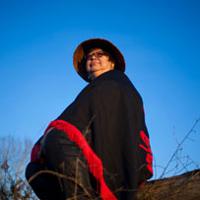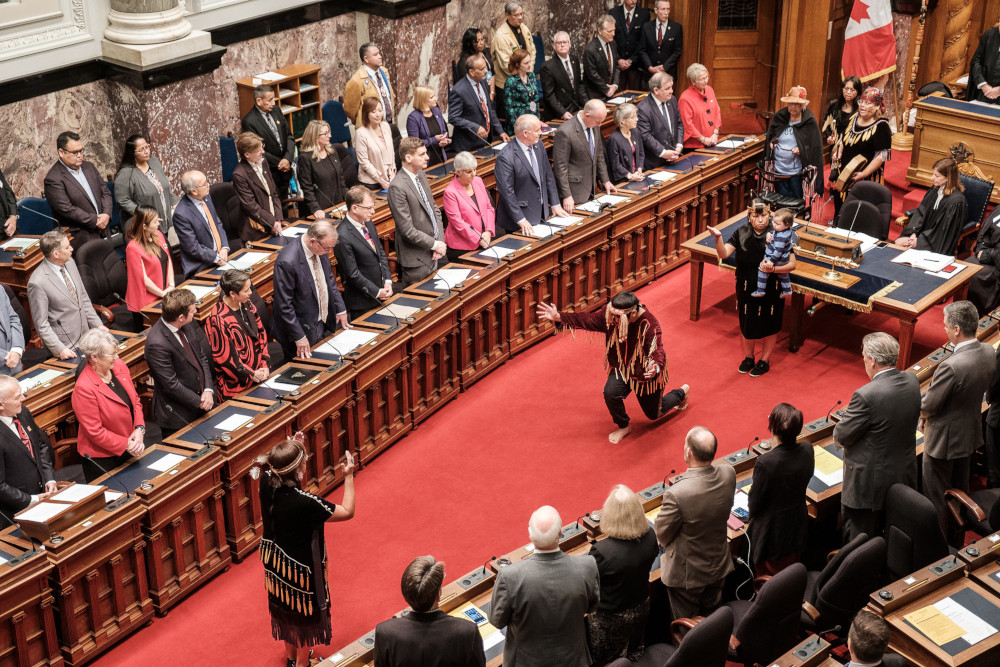Bill 41, the United Nations Declaration on the Rights of Indigenous Peoples Act, was introduced in the B.C. legislature last week to drumming, singing, prayers and the Lekwungen Dancers.
The day was heralded as “historic” because B.C. was the first jurisdiction in Canada to implement UNDRIP, and the legislation was described as signalling a new beginning for B.C.–First Nations relations.
I sat on the floor of the legislature as a witness to it all and heard a string of speakers — politicians and Indigenous leaders — give the history, the importance of how it was done and the work still ahead. I stood and gave standing ovations to each of the speakers, for what they said was worthy of accolades.
I waited to hear how it would impact Indigenous peoples every day in the communities. But I didn’t hear it, and I felt curiously empty.
Wasn’t it a significant day for all First Nations peoples? I want to explore that a little.
Bill 41 is not perfect, nor is it the panacea for all the issues facing Indigenous peoples or the answer for reconciliation and relationship-building. It will not eradicate racism or stop Indigenous women and girls from going missing.
But Bill 41 can be described as the foundation of a house, and we must now build that house based on our design.
Or it can be likened to a canoe, a vessel to take B.C. and First Nations on a journey to an agreed-upon destination. You need people to get in the canoe, and you need paddles and a decision to go in the same direction. We can go upstream, where paddling is difficult, but we are heading to places we really want to go. Or we can let the currents take us downstream without paddling, and let the canoe end up wherever the currents carry it. We need to be the paddlers of that canoe.
Bill 41 sets the stage for a lot of work, and it will take commitment and political will to move ahead together. A plan must be put in place to review all the laws of B.C. and make them consistent with UNDRIP. This must be done through consultation and cooperation with Indigenous peoples. The B.C. government cannot act alone and must get the processes right, as this is now a law they must live up to. It is not an election promise that can be forgotten or massaged to mean something else. First Nations can make B.C. accountable by forcing them to live up to their very own laws.
UNDRIP has 47 articles and covers many different areas, such as self-determination, education, language, culture, sacred sites, and the right to lands, waters and resources.
Yet what became the focal point of the launch of the legislation was Article 32, which sets out the obligation to ensure “free and informed consent prior to the approval of any project affecting their [Indigenous] lands or territories and other resources, particularly in connection with the development, utilization or exploitation of mineral, water or other resources.”
Some people fear that offers veto power, and that First Nations will say no to every project in their territories. But First Nations are already involved in many developments in their territories.
Yes, some First Nations are saying no to those developments that could take away their rights, destroy their lands or damage their waters, but there are good reasons to do so.
I find it hard to understand why it is OK for First Nations to say yes to developments, yet they cannot say no — that no means less than yes. It seems to me that as titleholders who own the land, the ability to say yes or no is inherent. First Nations members will be able to protect what is important to them from development, or set higher standards or change locations through free prior and informed consent, and this is very important to our members who want to continue to exercise their rights.
Bill 41 provides that B.C. and First Nations can come to agreement on joint decision-making or consent before decisions. What is not clear to me in the legislation is how long it will take to negotiate those agreements, or if agreements can be concluded in a reasonable time. Presumably the regulations implementing the law will include a dispute resolution process when First Nations and B.C. cannot come to agreement.
As you can see, putting the declaration into practice will take some work, and figuring out consent will need to be in the work plan.
I worked on the declaration for nine years in its early years. One of the key clauses we — Indigenous peoples from around the world — fought for was the right of self-determination. The right to freely determine our political status and pursue our own economic, social and cultural development. When this bill becomes law, all B.C. laws must support First Nations in our economic, social and cultural development. First Nations can develop in their own time, in their own way, and not be impeded by laws that do not support our development. We can use our own laws and traditional knowledge. This is a very positive part of the declaration. We determine our future, not B.C.
Aboriginal title remains unresolved in much of the province, though as Indigenous peoples we know the lands are ours. B.C. cannot simply assert title under UNDRIP. The declaration recognizes our right to own, use, develop and control our lands, territories and resources. We can assure our people that our lands are secure and that we can access our resources and manage our territories. B.C. laws will have to reflect this reality.
The declaration assures the right to establish and control our own educational institutions and revitalize our languages, and use our cultural methods of teaching and learning and use our languages. What a huge boost to getting our children through the educational systems. Laws in B.C. have to be changed to reflect the declaration and remove systemic barriers to our ability to educate our children in our way.
Until now, protecting sacred sites under the Heritage Conservation Act has not been possible, and they have been destroyed for development. The declaration gives First Nations the ability to protect and maintain sacred sites, and have access to them. The Heritage Conservation Act must be changed to allow proper protection.
These are just some of the benefits of Bill 41, and how it can help people in our communities.
People need to pay more attention to how this bill can lead to improvements in many areas of Indigenous peoples’ lives, and worry less about development and veto.
Once the bill is law, the work begins. Success depends on political will and a vision for the future. ![]()
Read more: Indigenous, Rights + Justice, BC Politics
















Tyee Commenting Guidelines
Comments that violate guidelines risk being deleted, and violations may result in a temporary or permanent user ban. Maintain the spirit of good conversation to stay in the discussion.
*Please note The Tyee is not a forum for spreading misinformation about COVID-19, denying its existence or minimizing its risk to public health.
Do:
Do not: